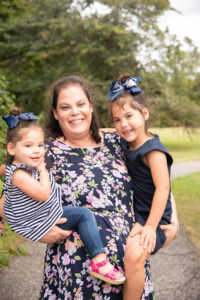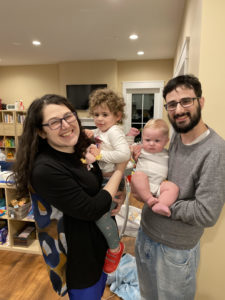Ellen Braunstein | Special to the JT
Ronna Flaks, 35, once retreated to the bathroom to cry at the sight of one too many swollen bellies — all pregnant mothers picking up their children at Bais Yaakov, an Orthodox day care where she worked.

Purim was the hardest time for Alex, 35, and Abigail Malischostak, 34, members of Chizuk Amuno Congregation in Pikesville, Md., who couldn’t get pregnant on their own.
“You’re seeing all the kids in costumes, and that’s all you want — to be there with your family and your children in costumes,” said Abigail Malischostak of Lutherville, Md. “There’s so much about organized Jewish life that is centered around the family that when you don’t have that, it’s harder to find your place.”
Both women were diagnosed as infertile, and both struggled with their husbands to get pregnant before science and modern medicine (and, they believe, prayer) gave them each a pair of healthy children. Along the way, they experienced profound loss — a life crisis causing stress, anxiety, depression and grief.
While pregnancy and childbirth are highly visible in the Jewish community, couples with infertility challenges tend to be invisible and suffering in silence. An answer to that emotional pain comes in the form of Seeds of Hope, a year-old program that now offers support groups for women and men in Baltimore.
An advisory board of fertility professionals provides guidance and leads community education programs.
The initiative is run by Jewish Community Services, with funding from the Jewish Women’s Giving Foundation of Baltimore, a program of The Associated: Jewish Federation of Baltimore.
“This project is a direct response to feedback from Jewish women, many of whom have shared personal stories of their own struggles with infertility,” said Michelle Goldberg, clinical social worker and senior manager, community engagement and partnership for JCS. “They felt there was insufficient support within their community to help them cope with infertility. This is an opportunity to meet with other women who can relate and begin building a community of support and understanding for each other.”
Infertility is a spiritual crisis as well, and the support group will bring in Jewish texts to study. “Judaism is based on family, and holidays are centered around family and children,” said Goldberg. “And there’s liturgy; the First Commandment says to be fruitful and multiply. Torah stories tell of women who suffered like Sarah and Hannah; they prayed to God and then their prayers were answered. It doesn’t always happen in real life.”
One in eight couples suffer from infertility as defined by the inability to achieve healthy pregnancy after one year of trying, according to the National Institute of Child Health and Human Development. Infertility also includes miscarriages and ectopic pregnancies.
The National Institute of Child Health and Human Development (NICHHD) also reports that fertility declines with age for both men and women, but the effects of age are much greater in women. In their 30s, women are about half as fertile as they are in their early 20s.
‘Very, very stressful’
Still, there’s hope for those facing infertility. A majority of cases are resolved through procedures involving surgery or medicine, according to the American Society for Reproductive Medicine.

Both intrauterine insemination (IUI) and in vitro fertilization (IVF) are common fertility treatments used to help couples who are struggling to get pregnant. The IUI is the least expensive and least invasive. Through IUI, the sperm is placed directly into the uterus using a speculum. Through IVF, eggs are surgically removed using a needle, and those eggs are fertilized outside of the body and planted in the uterus.
Mood swings are common during infertility treatment, as the body is impacted by medications and changing hormones to induce egg production. Every step must be timed perfectly to coincide with a woman’s ovulation cycle.
Not only do women contend with raging hormones, they also have to manage the hopes and fears that come with the process. “It’s one body blow after another, and that can be devastating,” said William Petok, a clinical psychologist in Baltimore who counsels couples experiencing infertility. He is also on the Seeds of Hope advisory board. “You get your hopes up and then you get your hopes dashed if you do the treatments repeatedly. That’s very, very stressful.”
Moreover, the cost of the IVF process is backbreaking even with health-insurance coverage, and many couples must experience multiple tries and failures, each running from approximately $16,000 to $20,000 or more, without the guarantee of a child.
Baltimore community Rabbi Nina Beth Cardin is on the Seeds of Hope infertility advisory board. Her own experience decades ago led her to write a book, “Tears of Sorrow, Seeds of Hope,” a spiritual companion guide for infertility and pregnancy loss. “I found no spiritual resources for supporting me and my husband through the loss, which is why I eventually wrote the book, a cathartic experience. It was a way for me to give back to the community — to create and present a resource that could help serve others like me.
“There is still a stigma of shame in not being able to get pregnant, and that maybe there’s something wrong with the woman or wrong with the man,” said Cardin, adding that it’s long overdue to have an organization in Baltimore that deals with this issue. “We are still so alone and silent about this loss.”
‘A whole slew of issues’
Atlanta-based Elana Frank started the national Jewish Fertility Foundation, which grew out of her own experiences. She had her IVF treatments in Israel done for free. “When I came back to America, I understood how expensive fertility treatments were, and I was shocked by that,” she said.
Her organization provides needs-based grants of up to $15,000 that go directly to fertility clinics, interest-free loans and free screening for more than 200 genetic diseases. The foundation is opening an office in the Greater Washington area with a grant from the Jewish Federation of Greater Washington and other donors. Baltimore and Denver are two more cities on the radar of the eight-year-old foundation, said Frank, but right now, offices serve the Jewish communities of Atlanta; Tampa, Fla.; Birmingham, Ala.; Cincinnati; and Pittsburgh, Pa.
Certain organizations in Baltimore target the Orthodox community with funding for infertility treatments for first-time parents. Flaks, as a would-be first time mother, wasn’t eligible because her now ex-husband had already had a child with his past wife.
The overall education of Jewish couples contributes to the problem, said Frank. “An educated community means that you’re going to college, you’re going to grad school, then you’re getting married and thinking about kids. That means you’re waiting later, and that presents a whole slew of issues.”
Flaks, who is now divorced, said she experienced a roller-coaster ride of high hopes and deep pain in her fertility odyssey. Her diagnosis was unexplained fertility.
She was married nine years before IUI brought two children into her life: Nechama, 5, and Shayna, 2. She noted that a frequent question before she became pregnant was “How many kids do you have?’ None. ‘Are you trying or whatever?’ which I always think is an inappropriate question. Are you asking if my husband and I have sex with each other?”
A rabbi told her to buy a double stroller, and it would bring her good luck.
She bought it. “I wanted a baby so badly that I’d do the most ridiculous thing.”
‘We definitely had to make choices and sacrifices’
Alex and Abigail Malischostak started trying to get pregnant a year after they married in 2016. She wanted a big family — four children. “Nothing was happening,” said Abigail, who works for the Jewish Volunteer Connection, a program of The Associated. “Like I had understood my cycles as much as possible, but I think you quickly learn that we really get trained on how to prevent pregnancy and not really how to achieve it.”
Doctors suspected she had polycystic ovarian syndrome, a leading cause of infertility in women. “We also had some male factor infertility, and we were given less than a 5% chance of conceiving without medical intervention,” she said.
The experience was taxing and the cost not insignificant. Eventually, they were able to manage it with insurance and financial help from family. The couple’s two children, Rose, 3, and Ezra, 15 months, were born through IVF. “We definitely had to make choices and sacrifices to make it happen. We recognize the privilege that we even had the ability to afford it, as many don’t have the ability to do so.”
Alex, a professional recruiter, said that infertility treatments meant being there for his wife. “There’s not all that much I’m able to do. She really has to do a lot of the heavy lifting, and it’s a little bit unfair for her.”
After one of many cycles, they decided to take their own pregnancy test. “We had never seen a positive [one]. It was exciting, and I think obviously made the whole thing feel like it was worth all that,” said Abigail.
People could be more supportive of their difficulties, but it’s a two-way street. “I think the lesson is that people are there for you as much as you’re able to be open, right? Like it’s hard for anyone to support someone when they don’t know what’s going on.”
To become a part of a fertility support group, call Michelle Goldberg at 410-466-9200 or email: [email protected].
Ellen Braunstein is a freelance writer.







